by Jochen Werne
1. Introduction – The Global Rise of Experian Automotive
Around the Experian world, Experian Automotive has become synonymous with data excellence, predictive intelligence, and ecosystem-scale innovation. The transformation from a specialized automotive data provider into one of the most influential players in global mobility analytics is rooted in decades of consistent strategy, rigorous data governance, and a relentless commitment to transparency and trust.
This evolution was profoundly shaped by the leadership of John Gray and the automotive team in North America. Under his guidance, Experian Automotive developed a suite of capabilities that reshaped how manufacturers, financial institutions, insurers, and mobility providers interpret risk, manage vehicles, design services, and interact with consumers.


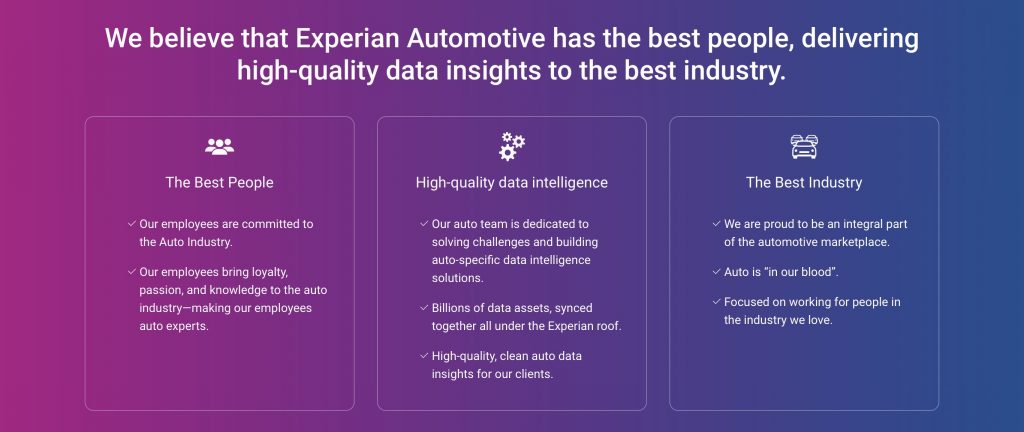
The rise of AutoCheck®, the creation of advanced registration, identity, and fraud analytics, and the integration of credit insights with vehicle data have established Experian as a cornerstone of the automotive value chain. Today, Experian Automotive powers decisions across billions of data points—supporting OEM development processes, remarketing, pricing optimization, EV analytics, fleet management, sustainability reporting, and the broader shift toward connected mobility.
With a proven track record across the United States and the United Kingdom, Experian’s automotive success story is now taking on new relevance in one of the world’s most iconic automotive regions: Germany.
2. Germany – A Legacy of Automotive Excellence Facing Historic Transformation
The German automotive industry has shaped global mobility for more than a century. From the invention of the automobile by Carl Benz to the engineering precision of Porsche, BMW, Audi, and Mercedes-Benz, Germany became a global benchmark for quality, performance, and craftsmanship. This legacy is so deeply embedded in Germany’s industrial identity that the sector remains one of the country’s most critical economic pillars.
Yet even industries with exceptional histories must navigate transformational moments. Today, Germany stands at such a crossroads.
Structural and Economic Pressures
German automotive players face cost-intensive production environments, global supply chain volatility, and increasing competitive pressure from rapidly scaling Asian EV manufacturers. Industry cycles are influenced by rising energy costs, geopolitical uncertainty, and intensified global competition.
Technological Disruption
The shift from combustion engines to electric drivetrains represents only part of the transition. The more profound transformation is the emergence of the software-defined vehicle (SDV). In this model, hardware becomes a platform for continuous software updates, digital services, predictive intelligence, and new business models.
Regulatory Demands
European regulation—particularly the AI Act, the Data Act, cyber-resilience standards, and ESG requirements—sets high expectations for data fairness, transparency, and lifecycle accountability. This regulatory environment demands world-class data quality and governance.
Cultural and Consumer Shifts
New generations favor convenience, flexibility, and digital experiences. Mobility subscriptions, car sharing, and integrated multimodal platforms increasingly supplement classical ownership.
Together, these dynamics signal that German automotive excellence must expand from mechanical innovation to data-driven innovation. Success increasingly depends on proprietary datasets, cloud-based analytics, and AI-enabled decision-making.
3. The New Paradigm: From Manufacturing Icons to Data-Connected Mobility Platforms
The automotive industry is no longer structured around single-product sales. Vehicles have become connected, cloud-integrated digital platforms—producing continuous data streams from sensors, telematics systems, charging behavior, driver interactions, and lifecycle events.
Value creation is shifting toward:
- continuous services rather than one-time sales,
- data-driven personalization,
- predictive maintenance,
- usage-based insurance and finance,
- mobility subscriptions,
- and comprehensive digital twins controlling entire lifecycles.
This transition requires something the industry historically lacked:
a unified, high-quality, interoperable data foundation enabling cross-system intelligence at scale.
Experian’s global capabilities align precisely with these needs. With proven data quality standards, sophisticated cloud-native analytics platforms, and a deep understanding of vehicle–consumer–finance interactions, Experian provides the infrastructure necessary for the next era of German mobility innovation.
4. Experian at IAA Munich – Insights Into a Changing Industry
The IAA Mobility in Munich has become the central stage where global automotive players discuss the future of mobility, AI, electrification, and data-driven transformation. Experian’s engagements at this year’s IAA revealed a clear consensus across OEMs, suppliers, mobility providers, insurers, and financial institutions:




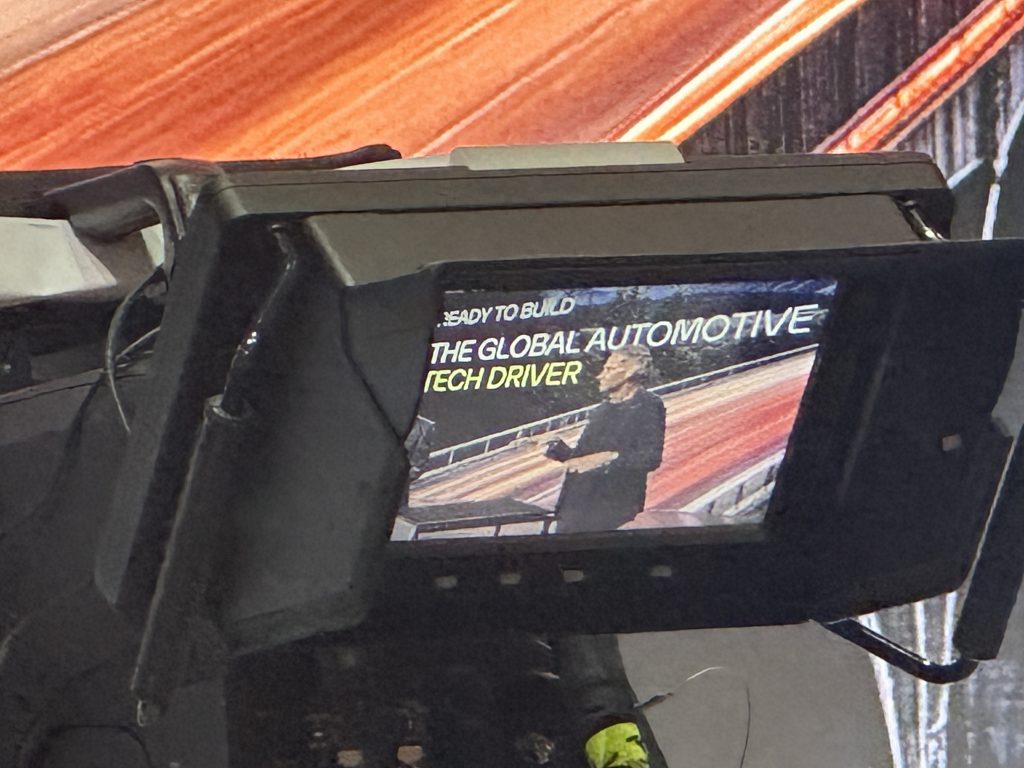


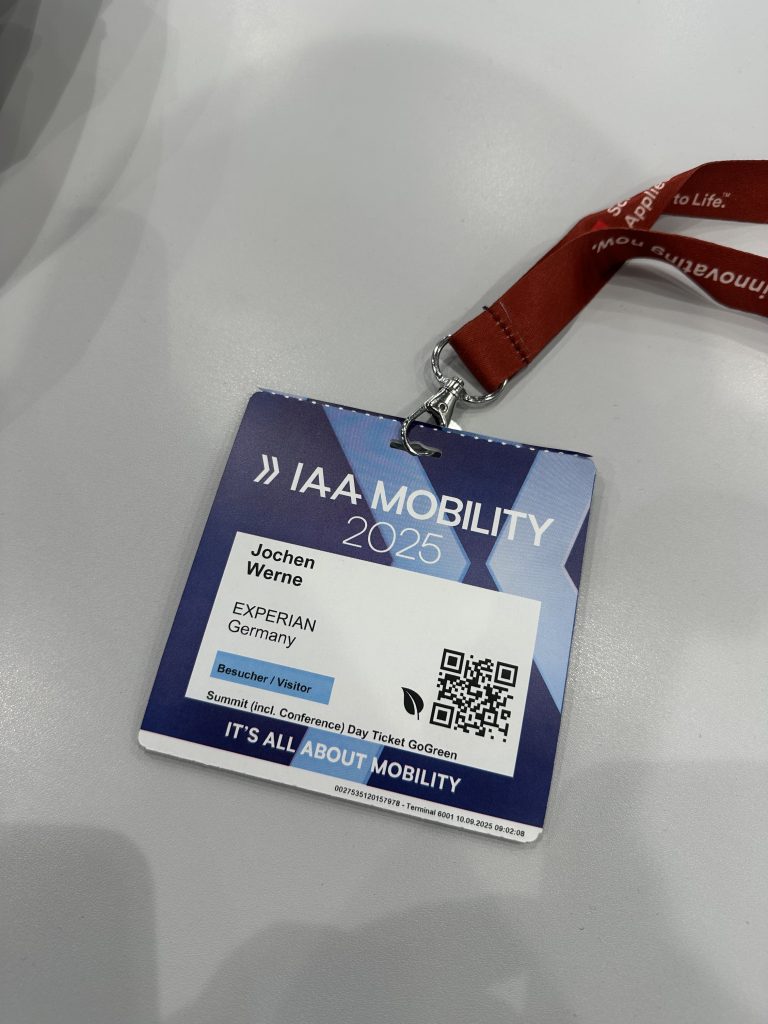
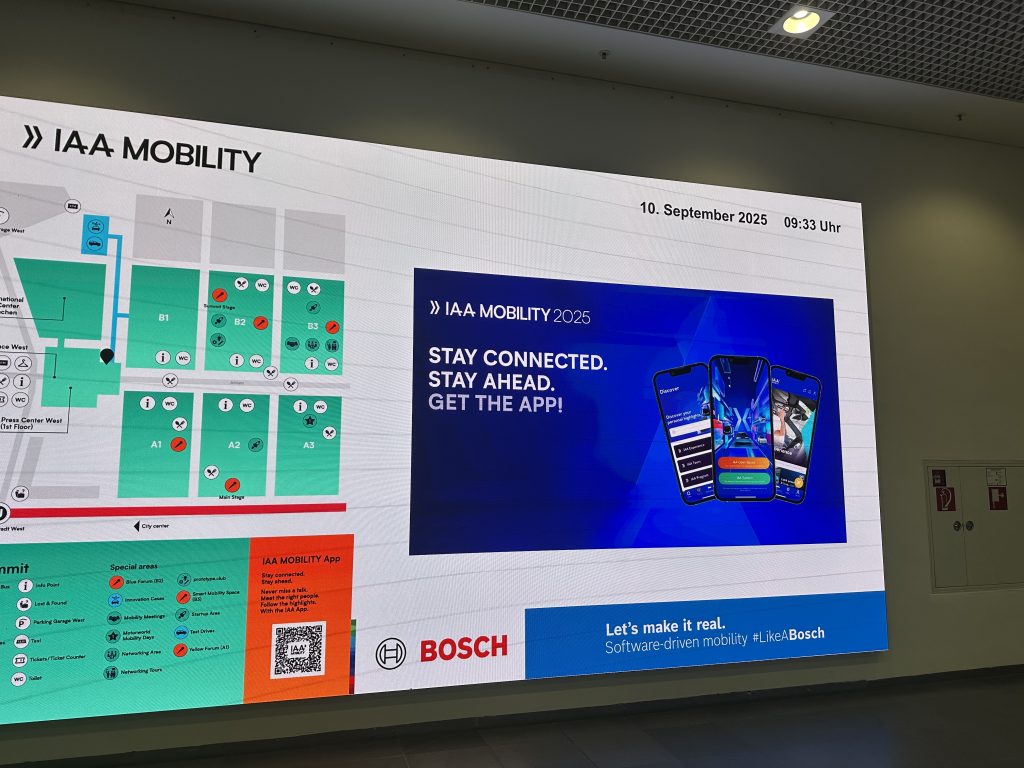
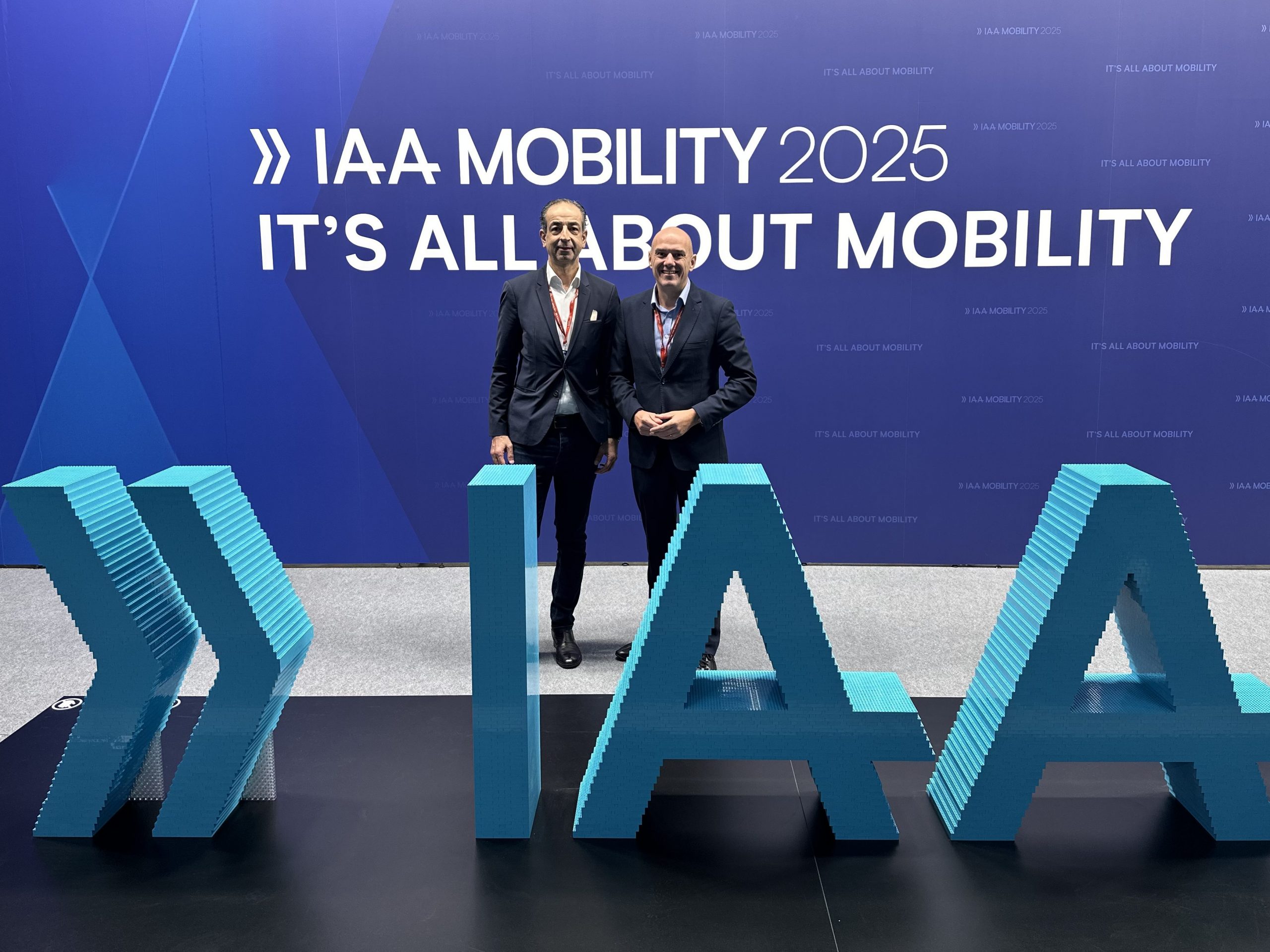
The German automotive ecosystem requires faster access to trustworthy data, interoperable platforms, and scalable AI to compete globally.
Discussions highlighted several recurring pain points:
- excessive fragmentation across internal systems,
- incomplete integration of financial, customer, telematics, and lifecycle data,
- slow scaling of pilot projects,
- insufficient data governance for AI models,
- and uncertainty about monetization potential.
Experian’s contribution—linking vehicle data, consumer insights, risk intelligence, and lifecycle analytics—addresses these challenges precisely where they hinder growth. The feedback received at IAA confirmed Germany’s readiness for a transformation supported by high-quality analytics and cloud-native data foundations.
5. Megatrends Reshaping the Automotive Ecosystem
The evolution of the automotive sector is shaped by interconnected megatrends requiring advanced data strategies and predictive intelligence:
Software-Defined Vehicles
Future vehicles depend on continuous data feedback and AI-driven updates. SDVs require robust data pipelines, cloud services, and digital identity management.
Electrification and Sustainability
EV lifecycle transparency, battery health analytics, charging optimization, and CO₂ reporting rely on integrated datasets that span engineering, infrastructure, and consumer behavior.
Digital Twin Ecosystems
Digital twins for vehicles, factories, supply chains, and consumer experiences are becoming indispensable for safety, efficiency, and predictive services—but only function with accurate, high-volume data streams.
Mobility-as-a-Service
Subscriptions, shared fleets, and multimodal platforms demand real-time analytics for pricing, maintenance, risk scoring, and fleet optimization.
AI Regulation and Trust Frameworks
The EU’s AI Act reinforces the need for transparent, auditable, fair, and explainable AI—areas where Experian has deep experience.
Platform Economy Integration
Success increasingly requires openness, interoperability, and ecosystem orientation. Closed data environments are becoming competitive disadvantages.
These trends demonstrate why Germany’s automotive future will depend on holistic, analytically robust, and cloud-based data infrastructures—precisely the type of platforms Experian has developed over decades.
6. The HHZ Conference – A Hub for AI, Data Strategy, and Future Mobility
The HHZ Conference 2025, hosted by the Herman Hollerith Center under the academic direction of Professor Alexander Rossmann, brought together industry leaders and digital experts to discuss the intersection of AI, cloud analytics, and industrial competitiveness. The conference affirmed that Europe’s future strength will depend on its ability to integrate data strategy, technological innovation, and market deployment.
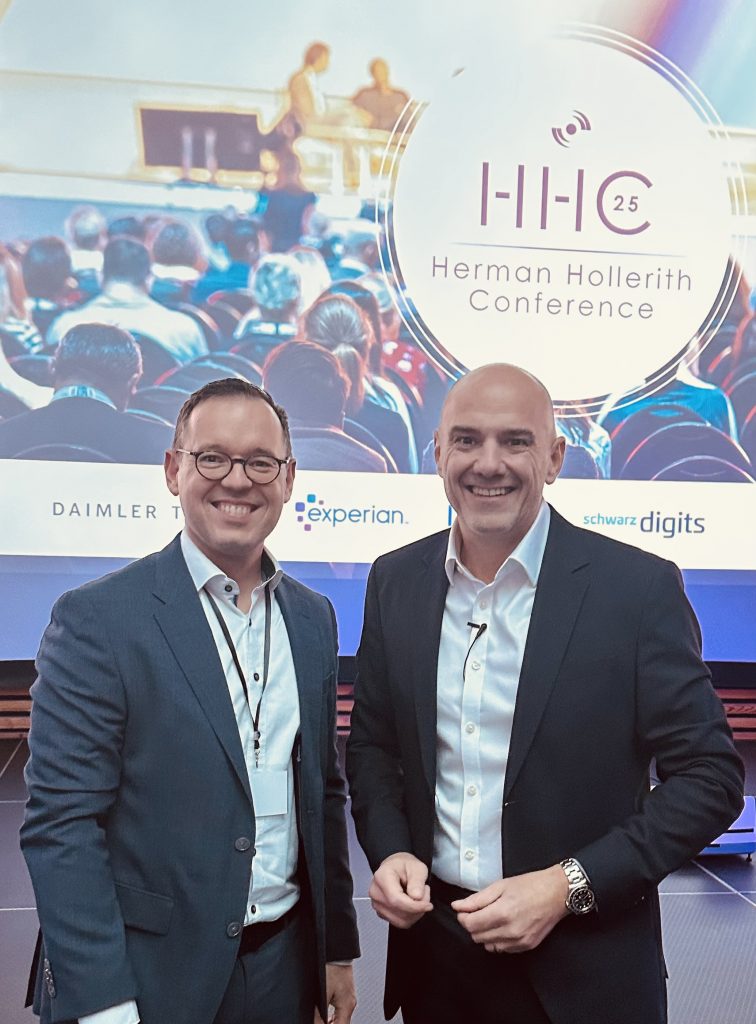


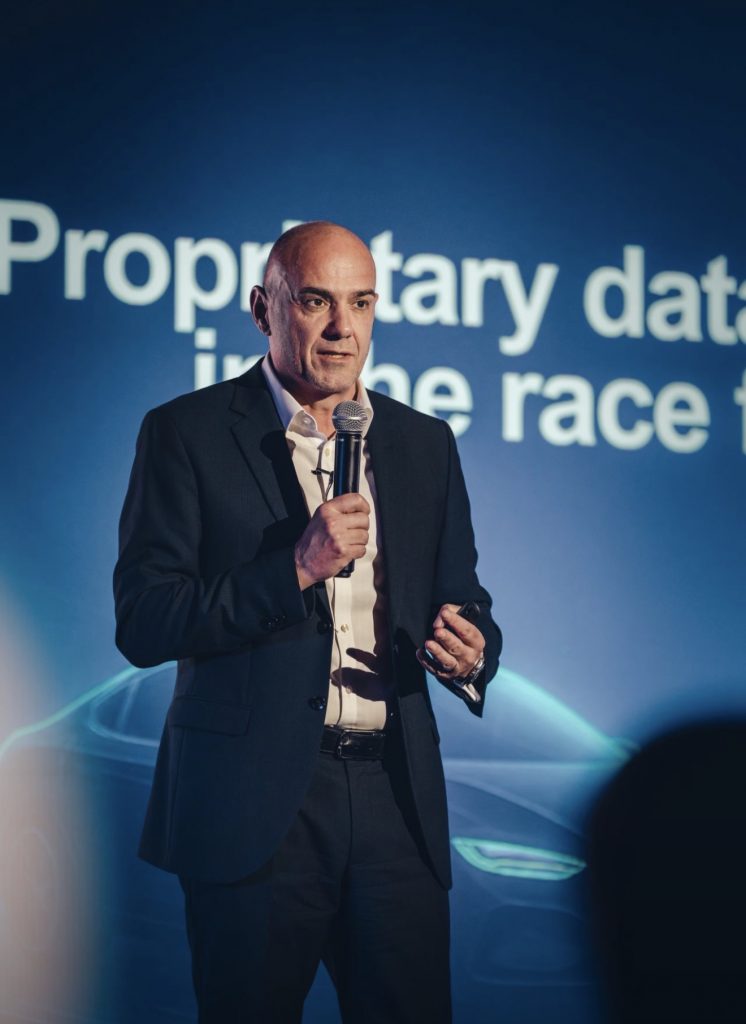
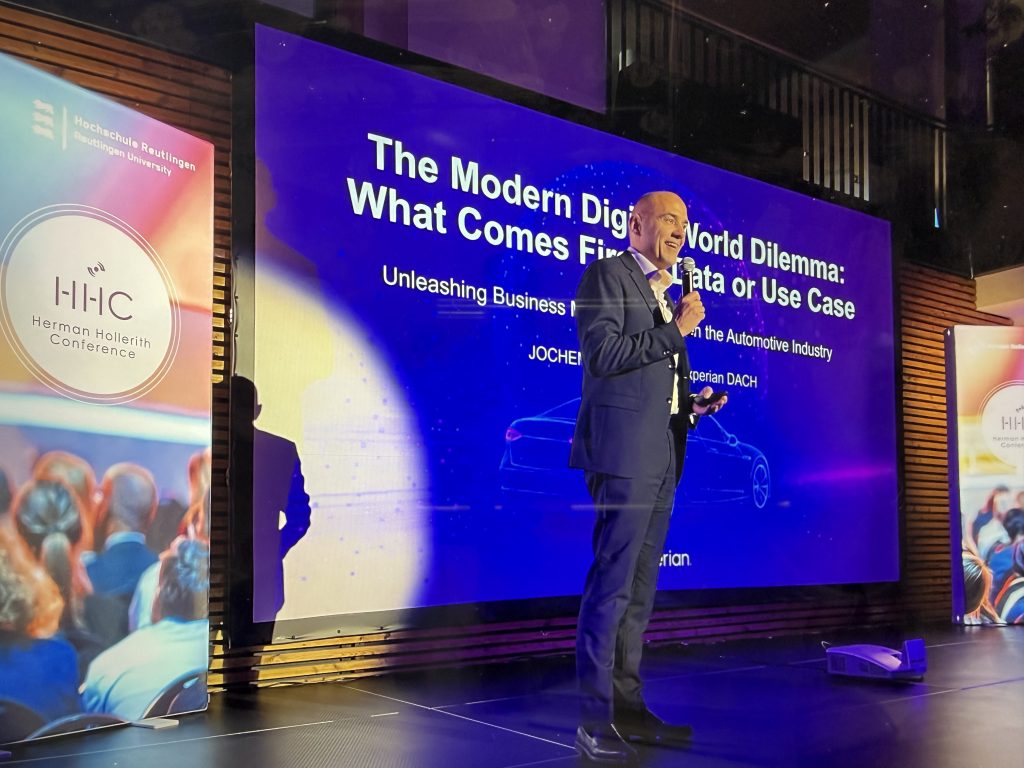

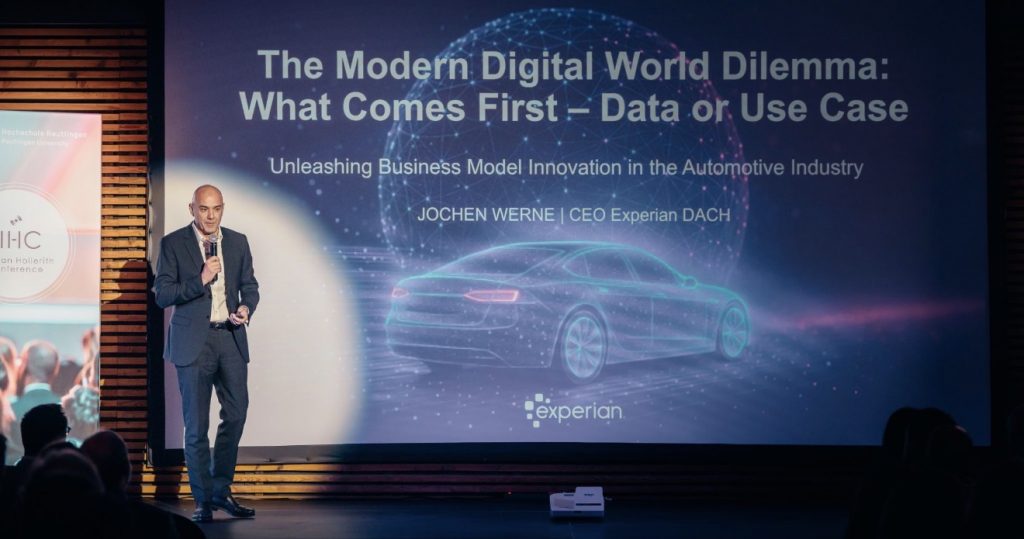


At this event, Experian presented the keynote:
“The Modern Digital World Dilemma: What Comes First – Data or Use Case?
Jochen Werne – CEO Experian DACH
Unleashing Business Model Innovation in the Automotive Industry.”
This keynote has become a reference point for industry experts evaluating how data strategies should be designed to support automotive transformation.
7. The HHZ Keynote – The Data Versus Use Case Dilemma
The keynote opened by revisiting a foundational insight from W. Edwards Deming:
“Without data, you’re just another person with an opinion.”
W. Edwards Deming
At the centre of the keynote lay a dilemma experienced across the global automotive industry.
Digital Twins, AI models, predictive analytics, and connected services all require extensive, high-quality, proprietary data. However, organizations often hesitate to invest in data acquisition without a clearly defined business model or ROI. Conversely, without access to robust data, use case development stagnates.
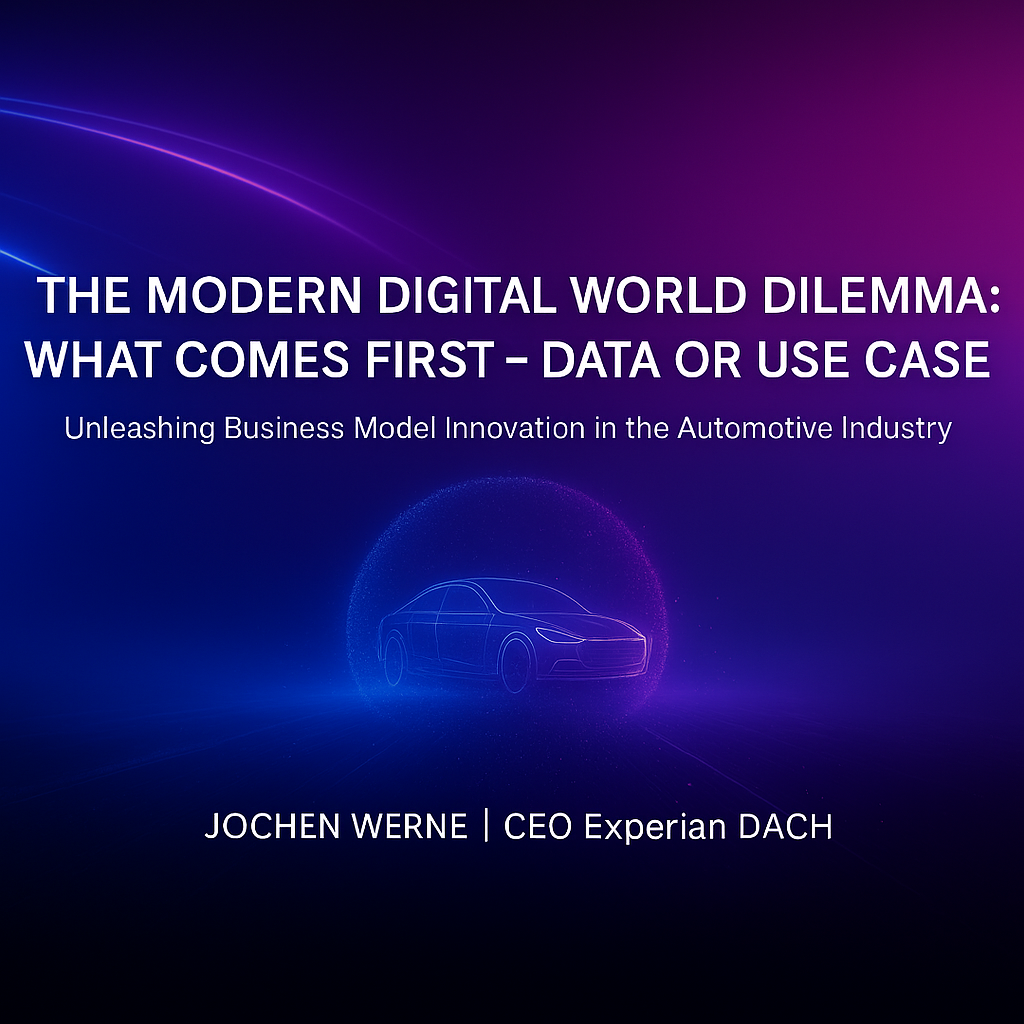
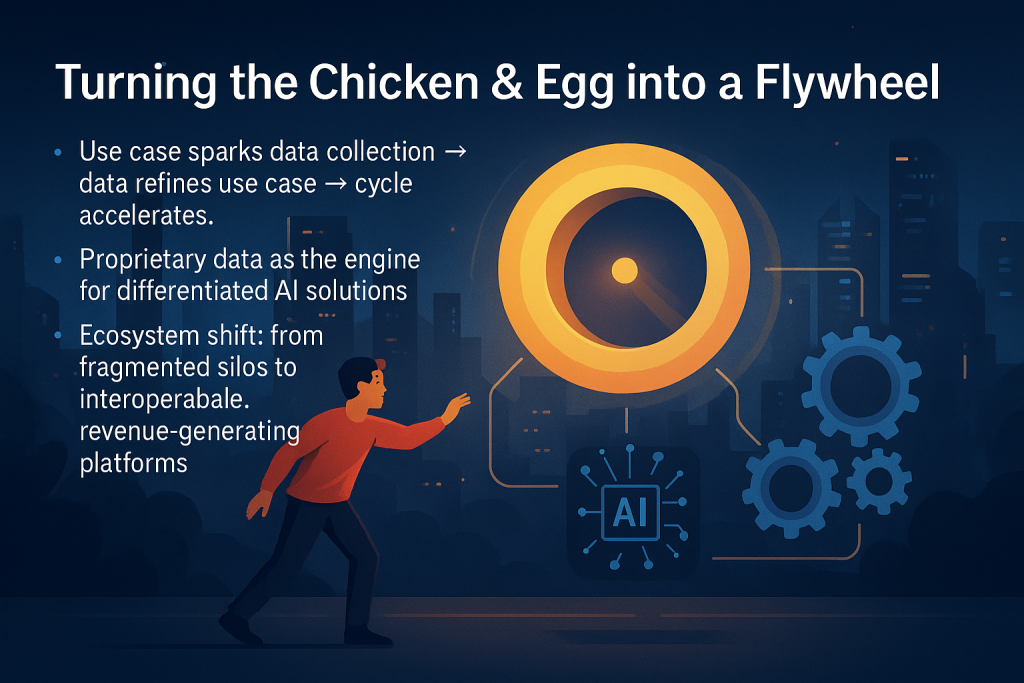
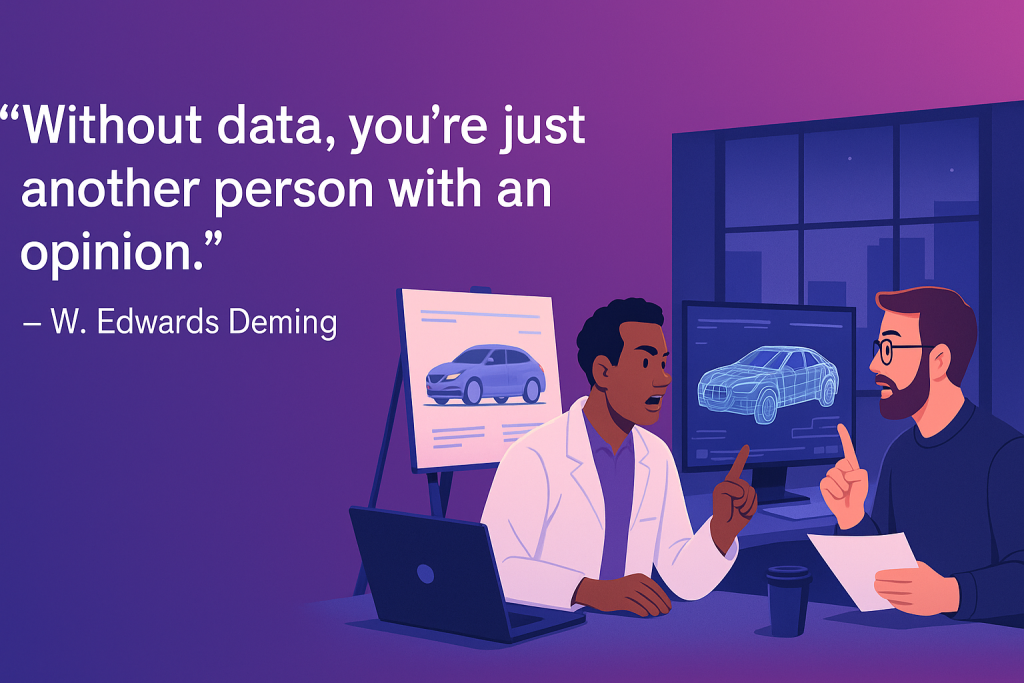
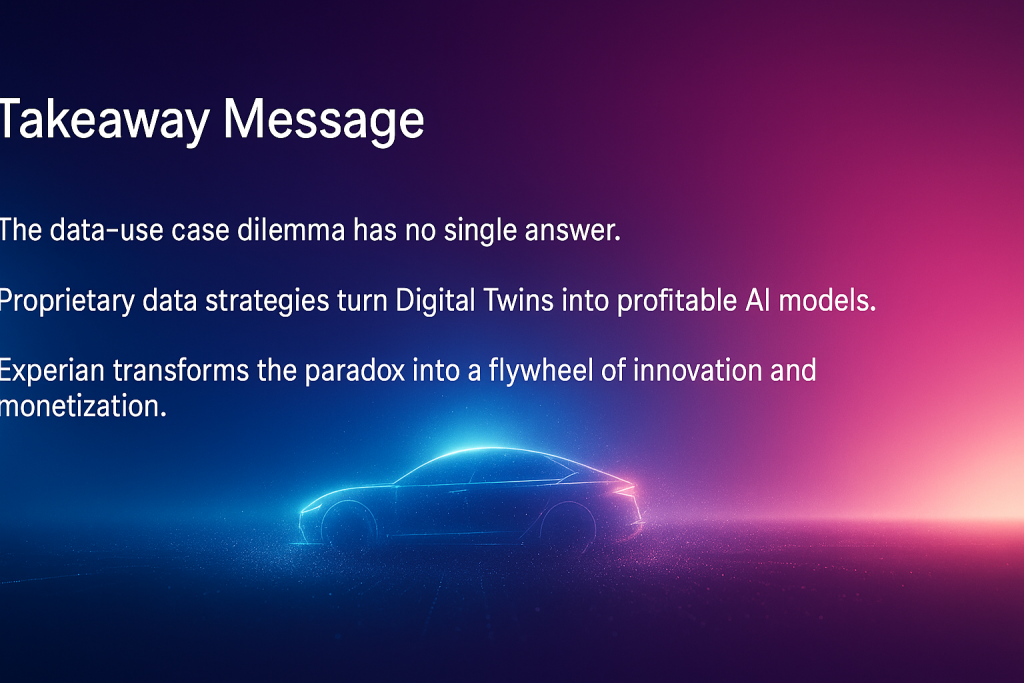
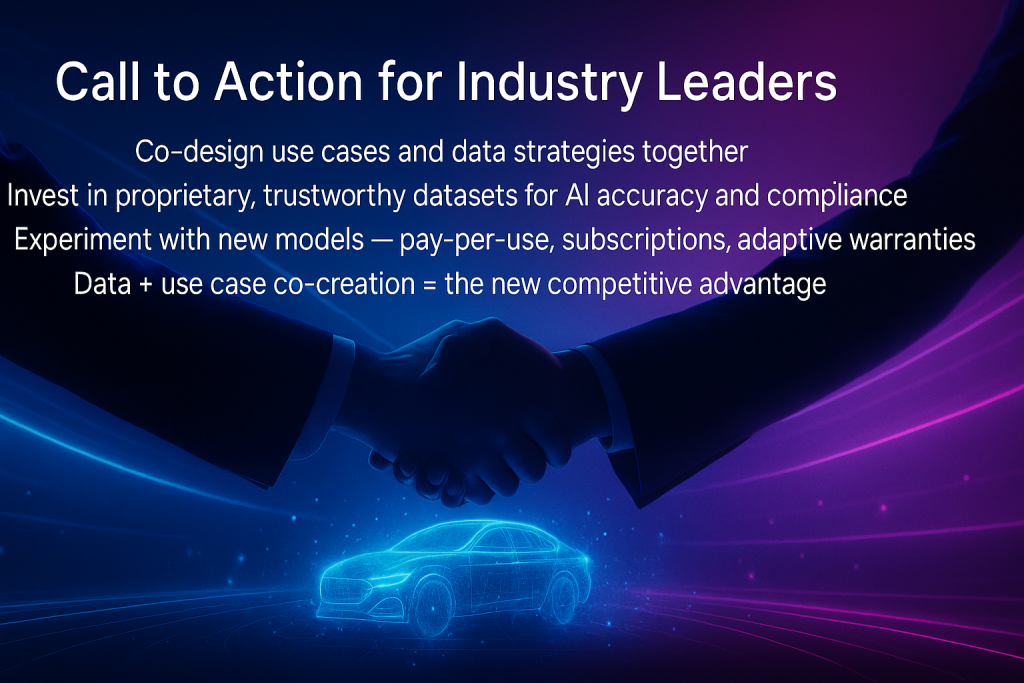
This tension—the need to define use cases while simultaneously collecting the data needed to power them—creates a strategic paradox for OEMs, suppliers, mobility platforms, insurers, and lenders.
To illustrate this dilemma, the keynote drew on typical scenarios from automotive R&D labs, where engineers debate whether Digital Twin environments must be fed with data before they can be built, or whether they should first be conceptualized to justify data acquisition. This reflects a broader challenge for the entire mobility ecosystem.
8. Digital Twins, Predictive Ecosystems, and the Industrial Barrier
The keynote demonstrated how Digital Twins represent one of the most transformative concepts in the automotive world. These virtual models replicate vehicles, components, or processes to optimize design, personalize user experiences, and forecast maintenance. They reduce waste, accelerate development cycles, and offer new commercial models such as adaptive warranties and subscription-based services.
Yet Digital Twins cannot operate in abstraction. They rely on:
- high-frequency telemetry,
- structured lifecycle data,
- behavioral insights,
- and interoperability across systems.
When these data foundations are missing—as is often the case—deployments remain fragmented and fail to scale.
Such challenges often arise from data silos, inconsistent data quality, lack of standardization across OEMs, and limited cross-industry collaboration.
9. Why Many Automotive Use Cases Fail to Achieve Scale
The keynote then examined why many digital transformation efforts stall at the proof-of-concept stage. Common issues include:
- fragmented data landscapes,
- isolated innovation initiatives without enterprise integration,
- inconsistent model governance,
- low interoperability across OEM systems and supplier networks,
- and insufficient proprietary datasets to support AI accuracy and regulatory compliance.
These findings reflect real-world experience from multiple global markets where similar challenges have hindered the scaling of data-driven solutions.
The conclusion was clear: the dilemma cannot be solved by isolating data strategies from use case strategies. Both must co-evolve.
10. Experian Case Studies – Turning Dilemma Into Flywheel
To illustrate how the dilemma can be overcome, several Experian case studies were introduced.
The Digital Vehicle Passport demonstrates how finance, insurance, and maintenance data can be integrated to create trust, transparency, and fraud reduction.
Adaptive leasing models and predictive maintenance solutions showcase how proprietary datasets allow AI to optimize lifecycle value.
Fleet subscription platforms exemplify how real-time behavioural data enhances pricing accuracy, operational efficiency, and recurring revenue models.
Across all examples, one principle emerged:
data and use cases must evolve together.
This creates a flywheel effect, where improved data enhances use cases, which then justify expanded data collection, accelerating innovation cycles.
11. Strategic Implications for the German Automotive Industry
The keynote concluded with a set of strategic implications essential for Germany’s transition into the next era of mobility:
- Developing data strategies and use cases simultaneously is crucial for efficiency and scale.
- Proprietary, high-quality datasets are essential for AI accuracy and regulatory alignment.
- Cloud-native analytics environments reduce friction and enable innovation at speed.
- Ecosystem collaboration—not isolated solutions—is the foundation for future competitiveness.
- Trustworthy data, transparency, and explainability must become strategic differentiators.
12. Experian Connecting the Dots – Cloud, AI, and Data Quality
Across the automotive value chain, Experian plays a decisive role in connecting previously fragmented data ecosystems. Through cloud-based analytics, proprietary datasets, and world-class governance, Experian accelerates decision-making and enables new business models.
By integrating vehicle data, consumer insights, financial information, telematics, fraud analytics, and ESG metrics, Experian creates a comprehensive view of mobility that empowers OEMs, suppliers, insurers, lenders, and fleet operators alike.
This ability to unify data enables:
- efficiency gains,
- improved risk management,
- monetization of connected services,
- predictive maintenance,
- and stronger customer engagement.
13. A Milestone: The Experian Ascend Sandbox Launch in Germany
A significant moment for the German market is the delivery of Experian’s Ascend Sandbox, hosted in the Frankfurt-based AWS cloud. This platform will serve as the analytical backbone for the first automotive client in Germany, enabling advanced modeling, simulation, and analytics workflows in a secure, scalable environment.
The teams around Frank Pfeiffer, Martin Baumann, Yu-Kai The and others have already produced early results showing immediate efficiency gains. These outcomes demonstrate how quickly German automotive companies can benefit from world-class analytics once the right infrastructure is in place.
14. Outlook – Data as the Engine of the Next Automotive Era
Germany’s automotive sector stands on the threshold of a new era defined by data, AI, cloud platforms, and predictive intelligence. Mechanical excellence remains vital, but sustainable competitiveness will depend increasingly on digital excellence.
Experian is committed to supporting this transformation. Through advanced data analytics, robust governance, cloud-native technology, and global automotive expertise, Experian will help the German market build:
- more efficient processes,
- more innovative services,
- more resilient business models,
- and more trusted digital ecosystems.
The launch of the Ascend Sandbox marks the beginning of a new chapter. The years ahead will show how the combination of German engineering and Experian data intelligence can unlock unprecedented potential.
The future of mobility will not only be electric, autonomous, or connected—it will be data-enabled, AI-driven, and platform-centric.
With this transformation underway, Experian stands ready to support the German automotive industry as it enters its next era of global leadership.


